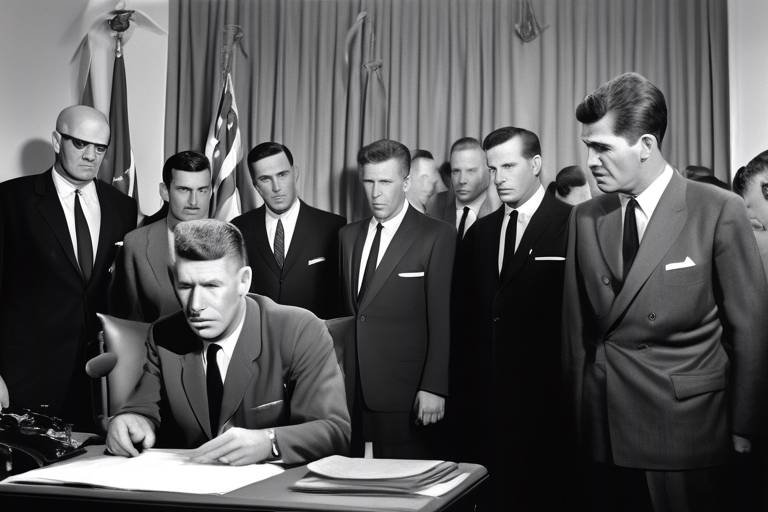The Legacy of the Age of Enlightenment - Ideas for Progress
The Age of Enlightenment, a period of intellectual and philosophical awakening in the 18th century, left a profound legacy that continues to shape our world today. The ideas and principles that emerged during this era have had a lasting impact on modern society, influencing everything from governance to culture. As we delve into the legacy of the Age of Enlightenment, we uncover a treasure trove of concepts that have paved the way for progress and development in numerous fields.
At the heart of the Enlightenment lay a commitment to reason, individualism, and skepticism. These core principles challenged the traditional authority of the church and monarchy, promoting the idea that individuals had the capacity to think for themselves and question the status quo. The emphasis on rationality and critical thinking laid the foundation for a new era of intellectual exploration and scientific discovery.
One of the key legacies of the Enlightenment is its impact on social and political structures. Enlightenment thinkers championed the ideals of equality, liberty, and human rights, advocating for a more just and equitable society. Their ideas laid the groundwork for modern democracy and inspired movements for social reform and political change.
Furthermore, the Enlightenment sparked a cultural renaissance, influencing literature, art, and music. Artists and writers of the time used their creativity to challenge prevailing norms and offer new perspectives on society. The era saw a flourishing of artistic expression that continues to inspire creativity and innovation today.
As we reflect on the legacy of the Age of Enlightenment, we are reminded of the enduring relevance of its ideas in our modern world. The principles of reason, individualism, and skepticism continue to inform our understanding of the world and shape our approach to progress and innovation. By embracing the legacy of the Enlightenment, we can draw inspiration from the past to address the challenges of the present and build a more enlightened future.

The Origins of the Age of Enlightenment
The Age of Enlightenment emerged in the 18th century as a period of intellectual awakening and cultural transformation in Europe. It was a time when reason, logic, and scientific inquiry began to challenge traditional beliefs and superstitions, paving the way for a new era of thought and progress.
One of the key factors that led to the Enlightenment was the Renaissance, which sparked a renewed interest in art, literature, and learning. This cultural revival laid the groundwork for the questioning of established authority and the exploration of new ideas.
Moreover, the Scientific Revolution played a crucial role in setting the stage for the Enlightenment. The groundbreaking discoveries of scientists like Galileo, Newton, and Copernicus shattered long-held beliefs about the natural world and encouraged a more empirical approach to understanding reality.
Enlightenment thinkers were also influenced by the political and social upheavals of their time, such as the rise of absolute monarchies and the growing demand for individual rights and freedoms. Figures like John Locke, Voltaire, and Montesquieu advocated for the rights of the individual and the need for a more just and equitable society.
Overall, the Age of Enlightenment was a period of profound change and intellectual ferment that laid the foundation for modern ideas of democracy, human rights, and scientific progress. Its origins can be traced back to a combination of cultural, scientific, and political developments that challenged the status quo and set the stage for a new era of thought and innovation.

Philosophical Foundations of Enlightenment
The are rooted in the fundamental principles of reason, individualism, and skepticism. During the Enlightenment era, thinkers emphasized the power of human reason to challenge traditional authority and dogma, paving the way for new ideas and intellectual freedom. This emphasis on reason as the primary source of knowledge revolutionized the way people viewed the world and their place in it.
Individualism was another key concept that emerged during the Enlightenment, highlighting the importance of personal autonomy, self-expression, and individual rights. Philosophers such as John Locke and Jean-Jacques Rousseau championed the idea of individual liberty and the social contract, laying the groundwork for modern notions of democracy and human rights.
Skepticism, characterized by a questioning attitude and a critical examination of beliefs, played a crucial role in challenging established norms and fostering intellectual inquiry. Philosophers like David Hume and Immanuel Kant raised doubts about the limits of human knowledge and the reliability of sensory experience, leading to a deeper understanding of the complexities of human cognition.
These philosophical foundations not only shaped the intellectual landscape of the Enlightenment but also had a profound impact on the development of modern society. By promoting reason, individualism, and skepticism, Enlightenment thinkers laid the groundwork for a more rational, egalitarian, and progressive world.

Scientific Advancements and Rationalism
During the Age of Enlightenment, scientific advancements and rationalism played a pivotal role in shaping the intellectual landscape of the era. The emphasis on reason and empirical evidence led to significant breakthroughs in various scientific disciplines, challenging traditional beliefs and paving the way for a new understanding of the natural world. Visionary thinkers such as Isaac Newton, Galileo Galilei, and Rene Descartes championed the importance of observation and experimentation, laying the foundation for modern scientific inquiry.
One of the key aspects of scientific advancements during the Enlightenment was the rejection of dogma and superstition in favor of rational thinking. This shift towards evidence-based reasoning revolutionized the way people viewed the universe, leading to the development of new theories and methodologies that continue to shape scientific inquiry today. The Enlightenment thinkers believed in the power of human intellect to uncover the mysteries of the world through systematic observation and logical deduction.
Furthermore, the promotion of rationalism during the Enlightenment era challenged traditional authority and encouraged individuals to question established beliefs. This spirit of skepticism and critical thinking not only fueled scientific progress but also laid the groundwork for the development of modern philosophy and ethics. The Enlightenment thinkers sought to apply the principles of reason and logic to all aspects of human life, advocating for the use of rationality in decision-making and problem-solving.
Scientific advancements and rationalism also had a profound impact on society, influencing the way people viewed themselves and their place in the world. The Enlightenment's emphasis on empirical evidence and logical reasoning fostered a culture of innovation and discovery, leading to advancements in technology, medicine, and other fields. This commitment to rational inquiry and evidence-based knowledge continues to drive progress and development in the modern world, shaping our understanding of the universe and our place within it.

Social Reforms and Political Ideals
Topics to be discussed in the article include the impact of the Age of Enlightenment on modern society, key philosophical ideas that shaped the era, and how these concepts continue to influence progress and development today.
Exploring the historical context and events that led to the emergence of the Age of Enlightenment, highlighting key figures and their contributions to intellectual thought.
Examining the core principles of reason, individualism, and skepticism that defined the Enlightenment era and paved the way for new ideas and societal norms.
Discussing the scientific breakthroughs and emphasis on rational thinking during the Enlightenment, and how these concepts revolutionized the understanding of the natural world.
The Age of Enlightenment brought about significant social reforms and political ideals that reshaped the fabric of society. Philosophers and thinkers of the era advocated for the rights of individuals, challenging traditional hierarchies and promoting the idea of equality before the law.
One of the key aspects of social reform during this period was the push for democratic governance and the protection of human rights. Enlightenment ideals laid the groundwork for modern democratic systems, emphasizing the importance of representation, freedom of speech, and the rule of law.
Moreover, the Enlightenment era saw a shift in societal attitudes towards power and authority. The concept of popular sovereignty gained traction, advocating for the idea that political authority is derived from the consent of the governed, rather than from divine right or hereditary privilege.
These social reforms and political ideals set the stage for the modern concepts of democracy, individual rights, and social justice. The Enlightenment thinkers' emphasis on reason and critical thinking continues to influence political discourse and policymaking, shaping the way societies approach governance and human rights issues.
Exploring how Enlightenment values influenced literature, art, and music, sparking a cultural renaissance and promoting creativity as a means of social critique and expression.
Reflecting on the enduring legacy of the Enlightenment in contemporary thought, education, and governance, and how these ideas continue to shape progress and innovation.
Addressing criticisms and challenges to Enlightenment principles, such as the limitations of reason, cultural relativism, and the ongoing struggle for equality and justice.
Considering how the ideals of the Enlightenment can inform current issues and debates, offering insights into solving global challenges and promoting a more just and equitable society.

Cultural and Artistic Expression
During the Age of Enlightenment, cultural and artistic expression flourished as a reflection of the era's values and ideals. Artists and writers embraced the spirit of intellectual curiosity and rationality, using their creativity to challenge traditional norms and explore new perspectives.
One of the key aspects of cultural expression during the Enlightenment was the emphasis on individualism and personal freedom. Artists sought to break free from the constraints of religious and political authorities, using their work to express their unique viewpoints and critique societal injustices.
Literature played a significant role in spreading Enlightenment ideas to a wider audience. Writers such as Voltaire, Rousseau, and Montesquieu used their works to advocate for social reform, religious tolerance, and the importance of reason in human affairs. Their writings sparked debates and inspired movements for change across Europe.
Artistic movements of the time, such as Neoclassicism and Romanticism, reflected the intellectual currents of the Enlightenment. Neoclassical artists drew inspiration from ancient Greek and Roman art, emphasizing clarity, order, and rationality in their work. On the other hand, Romantic artists focused on emotion, nature, and the individual experience, challenging the rationalism of the Enlightenment while still embracing its spirit of freedom and self-expression.
Music also underwent a transformation during the Enlightenment, with composers like Mozart and Beethoven pushing the boundaries of traditional forms and conventions. Their innovative approach to music reflected the spirit of experimentation and creativity that defined the era, paving the way for new musical styles and techniques.
Overall, the cultural and artistic expression of the Enlightenment was a vibrant and dynamic reflection of the intellectual ferment of the time. Artists and thinkers used their creative talents to engage with the pressing issues of society, challenging existing norms and shaping the cultural landscape for generations to come.

Legacy in Modern Thought and Society
The legacy of the Age of Enlightenment continues to resonate in modern thought and society, shaping our understanding of progress and innovation. The foundational principles of reason, individualism, and skepticism championed during this era have left an indelible mark on contemporary education, governance, and intellectual discourse. As we navigate the complexities of the 21st century, the Enlightenment's emphasis on critical thinking and rationality remains a guiding light in a world of rapid change and uncertainty.
One of the key contributions of the Enlightenment to modern society is the promotion of scientific inquiry and empirical evidence as the basis for understanding the natural world. This commitment to rationalism has paved the way for groundbreaking discoveries and technological advancements that have transformed our lives in profound ways. From the exploration of outer space to the mapping of the human genome, the legacy of Enlightenment rationalism continues to drive scientific progress and innovation.
Furthermore, the Enlightenment's influence on social and political thought has been instrumental in the development of democratic ideals and the recognition of human rights. Concepts such as equality, liberty, and justice, which were championed by Enlightenment thinkers, have become foundational principles of modern democracies around the world. The ongoing struggles for social justice and equality can be traced back to the Enlightenment's call for universal rights and the rejection of arbitrary authority.
In the realm of culture and the arts, the Enlightenment's emphasis on creativity and expression has inspired generations of artists, writers, and musicians to push boundaries and challenge societal norms. The belief in the power of art to provoke thought and stimulate change remains a central tenet of modern artistic movements that seek to address pressing social issues and promote cultural diversity.
As we grapple with the complexities of a rapidly changing world, the legacy of the Age of Enlightenment serves as a reminder of the enduring power of ideas to shape our societies and drive progress. By embracing the spirit of inquiry, reason, and humanism that defined the Enlightenment era, we can continue to build a more inclusive, equitable, and enlightened world for future generations.

Challenges to Enlightenment Ideals
As much as the Age of Enlightenment brought about groundbreaking ideas and progressive change, it was not without its challenges and criticisms. One of the primary challenges to Enlightenment ideals is the inherent limitations of reason. While reason was heralded as the guiding principle for understanding the world and shaping society, critics argue that human rationality is fallible and subject to biases and limitations. This raises questions about the extent to which reason can truly lead to universal truths and solutions.
Furthermore, cultural relativism poses a significant challenge to Enlightenment principles. The idea that values and beliefs are relative to the culture in which they arise challenges the notion of universal human rights and moral principles. Critics argue that the Enlightenment's emphasis on reason and individualism may not necessarily align with diverse cultural perspectives and traditions, leading to tensions between universal ideals and cultural diversity.
Another key challenge to Enlightenment ideals is the ongoing struggle for equality and justice. While the Enlightenment promoted the ideals of equality, liberty, and fraternity, the reality of social inequality and injustice persists in modern society. Issues such as systemic discrimination, economic disparities, and social injustices highlight the gap between Enlightenment principles and the lived experiences of many individuals.
Despite these challenges, the legacy of the Enlightenment continues to inspire discussions and debates on how to address these complex issues in contemporary society. By acknowledging and engaging with the criticisms and limitations of Enlightenment ideals, we can strive towards a more inclusive, equitable, and just world that upholds the values of reason, freedom, and progress.

Applying Enlightenment Principles Today
In today's complex world, the timeless principles of the Enlightenment era hold significant relevance and offer valuable insights into addressing contemporary challenges. By embracing the ideals of reason, individualism, and skepticism, we can navigate the intricate web of global issues with a clear and rational mindset. Just as Enlightenment thinkers sought to question and challenge existing norms, we too can apply critical thinking to societal issues and advocate for positive change.
One way to apply Enlightenment principles in modern times is by promoting education as a tool for empowerment and enlightenment. By fostering a culture of lifelong learning and intellectual curiosity, we can empower individuals to think critically, question authority, and engage in informed decision-making. Education becomes not just a means to acquire knowledge but a pathway to personal and societal progress.
Furthermore, the ideals of social reform and political liberty championed during the Enlightenment can serve as a guiding light in the fight for equality and justice today. By advocating for human rights, democracy, and the rule of law, we uphold the legacy of Enlightenment thinkers who dared to challenge oppressive systems and envision a more equitable society. Through activism and civic engagement, we can strive towards a world where every individual is treated with dignity and respect.
Moreover, the emphasis on scientific advancements and rational thinking during the Enlightenment can inform our approach to addressing pressing environmental and technological challenges. By embracing evidence-based decision-making and innovative solutions, we can tackle issues such as climate change, sustainable development, and ethical dilemmas in the digital age. Just as Enlightenment thinkers revolutionized the understanding of the natural world, we too can harness the power of science and reason to shape a better future for generations to come.
Frequently Asked Questions
- What was the Age of Enlightenment?
The Age of Enlightenment was a period in European history during the 18th century characterized by a focus on reason, science, individualism, and skepticism. It was a time of intellectual flourishing, where new ideas about government, society, and the natural world emerged.
- Who were some key figures of the Enlightenment?
Notable figures of the Enlightenment include philosophers like Voltaire, John Locke, and Immanuel Kant, who championed ideas such as freedom of thought, equality, and the importance of reason. Scientists like Isaac Newton and Galileo Galilei also made significant contributions to the era.
- How did the Enlightenment impact modern society?
The Enlightenment laid the foundation for many modern concepts, including democracy, human rights, and the scientific method. Its emphasis on critical thinking and individual rights continues to influence politics, education, and social movements today.
- What were some criticisms of Enlightenment ideals?
Some critics argue that Enlightenment principles, such as rationalism and universalism, can be Eurocentric and fail to account for cultural diversity. Others point out the limitations of reason in addressing complex social issues and the challenges of achieving true equality.
- How can we apply Enlightenment principles in the present day?
By promoting values like reason, tolerance, and equality, we can work towards creating a more just and equitable society. Embracing scientific inquiry, protecting individual freedoms, and fostering intellectual curiosity are ways to uphold the legacy of the Enlightenment in the modern world.



















